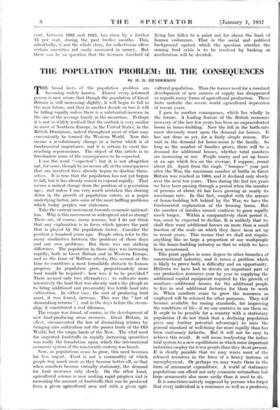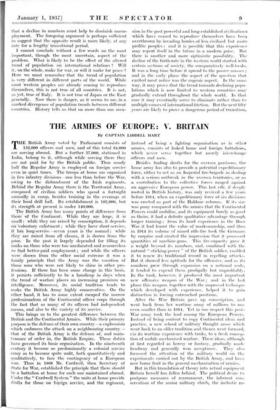THE POPULATION PROBLEM : THE CONSEQUENCES
By H. D. HENDERSON I use the word " expected": but it is not altogether apt, for some, though by no means all, of the consequences that arc involved have already begun to disclose them- selves. It is true that the population has not yet begun to fall, but it has already ceased to expand rapidly. That means a radical change from the position of a generation ago ; and unless I am very much mistaken this slowing down in the growth of population enters, as a major underlying factor, into some of the most baffling problems which today perplex our statesmen.
Take the current movement towards economic national- ism. Why is this movement so widespread and so strong? There are, of course, many reasons, but I do not think that any explanation is in focus which ignores the part that is played by the population factor. Consider the position a hundred years ago. People often refer to the many similarities between the problems of those days and our own problems. But there was one striking difference. The population in those days was increasing rapidly, both in Great Britain and in Western Europe, and as the fame of Malthus attests, this seemed at the time to constitute a most formidable obstacle to human progress. As population grew, proportionately more food would be required : how was it to be provided ? There seemed only two alternatives : to cultivate more intensively the land that was already under the plough or to bring additional and presumably less fertile land into cultivation. In either case, the cost of producing food must, it was feared, increase. This was the " law of diminishing returns " ; and in the days before the steam- ship, it constituted a real dilemma.
The escape was found, of course, in the development of new food-producing areas overseas. Great Britain, in effect, circumvented the law of diminishing returns by bringing into cultivation not the poorer lands of the Old World, but the virgin lands of the New. The vital need for imported foodstuffs in rapidly increasing quantities was really the foundation upon which the international economic system of the nineteenth century was based.
Now, as populations cease to grow, this need becomes far less urgent. Food is not a commodity of which people buy much more as they become better off, so that when numbers become virtually stationary, the demand for food increases only slowly. On the other hand, agricultural science is now making rapid progress. and is increasing the amount of foodstuffs that can be produced from a given agricultural area and with a given agri- cultural population. Thus the former need for a constant development of new sources of supply has disappeared as. regards many forms of agricultural production. These facts underlie the severe `world agricultural depression of recent years.
I pass to another consequence, which lies wholly in the future. A leading feature of the British economic recovery of the last few years has been an unprecedented boom in house-building. Now the fall in the birth-rate must obviously react upon the demand for houses. It has not done so yet, for a fairly simple reason. The unit in the demand for house-room is the .family. So long as the number of families grows, there will be a demand for additional houses, whether total numbers are increasing or not. People marry and set up house at an age which lies on the average, I suppose, round about 25. Apart from the single " bumper " year just after the War, the maximum number of births in Great Britain was reached in 1903, and it declined only slowly over the next ten years. Thus during the last ten years we have been passing through a period_ when the number of persons of about 25 has been growing at nearly its maximum rate. In this fact, coupled with the arrears of house-building left behind by the War, we have the fundamental explanation of the housing boom. . But the number of families cannot continue to groNi rapidly much longer. Within a comparatively short period it, too, must be expected to decline. It is unlikely that we shall then want additional houses on more than a small fraction of .the scale on which they have been set up in recent years. This means that we shall not require anything like so large a proportion. of our workpeople in the house-building industry as that to which we have been accustomed. _ _ This point applies in some degree to other branches of constructional industry, and it raises a problem which is likely to prove both a difficulty and an opportunity. Hitherto we have had to devote an important part. of our productive resources year by year to supplying the additional capital equipment required by. the growth of numbers—additional houses for the additional people to live in and additional factories for them to work in. When numbers cease to. grow the resources so employed will be released.for other purposes. They. will become available for raising standards, for improving the conditions of life—if we can contrive to use them so. It ought to be possible for a country with a stationary population (I do not think that a declining population gives any further potential advantage) to raise the general standard of well-being far more rapidly than has been customary hitherto. But it will not be easy to achieve this result. It will mean readjusting the indus- trial system to a new equilibrium in which some important industries employ far fewer people than they do at present. It is clearly possible . that we may waste most of the released resources in the form of a heavy increase of unemployment. . Or perhaps we may waste them in the form of armament. expenditure. A. world of stationary populations can afford not only economic rationalism but large armaments also . more easily than it used to do.
It is sometimes naively supposed by persons who forget that every individual is a consumer as well as a producer, that a decline in numbers must help to diminish unem- ployment. The foregoing argument is perhaps sufficient to suggest that the opposite result is more likely, at any rate fin.a lengthy transitional period. • I cannot conclude Without a few words on the most important, though the most uncertain, aspect of the problem. What is likely to be the effect of the altered trend of population on international relations ? Will it, on the whole, make for war, or will it make for peace? Here we must remember that the trend of population is very different in different parts of the world. While most western peoples are already ceasing to reproduce themselves, this is not true of all countries. It is not, as yet, true of Italy. It is not true of Japan or the East generally. Now there is danger, as it seems to me, in a marked divergence of population trends between different countries. History tells us that on more than one occa- sion in the past powerful and long-established civilisations Which have ceased to reproduce themselves have been overthrown by invading hordes of less civilised but more prolific peoples ; and it is possible that this experience May repeat itself in the future in a modern. guise.- But there is another and more optimistic possibility. The decline of the birth-rate in the western world started with certain sections of society, the comparatively well-to-do. It was a long time before it spread to the poorer masses ; and in the early phase the aspect of the question that excited most notice was the eugenic aspect. In the same way, it may prove that the trend towards declining popu- lations which is now limited to western countries may gradually extend throughout the whole world. In that ease it may eventually serve to eliminate rather than to multiply causes of international friction. But the nextlift' years are likely to prove a dangerous period of transition.







































 Previous page
Previous page